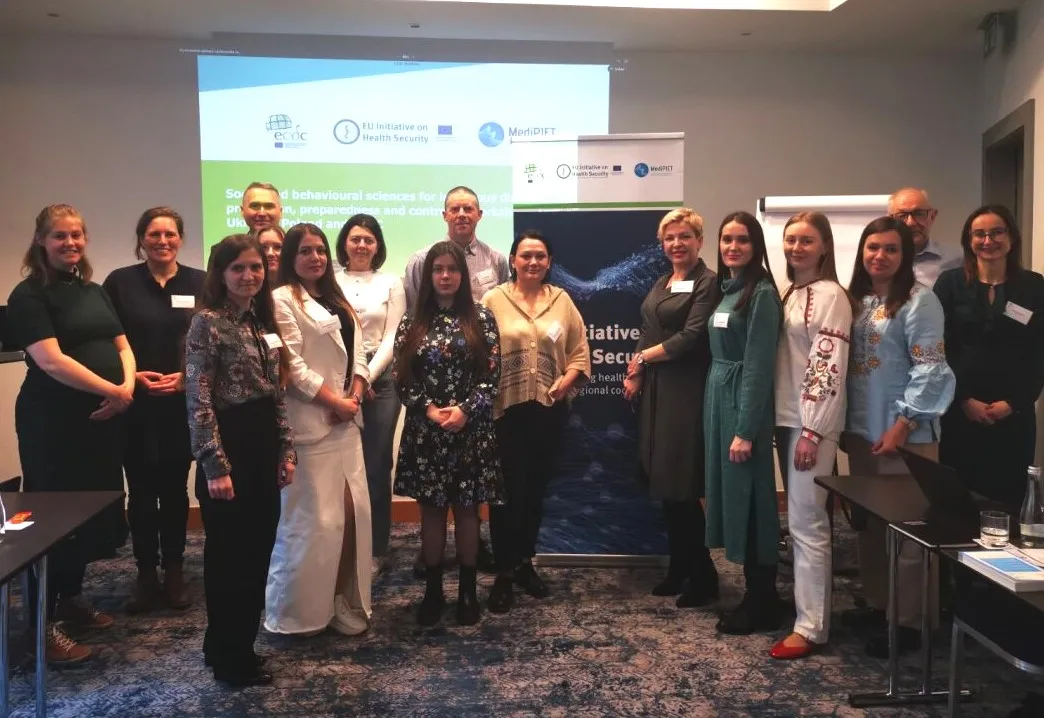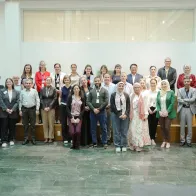Workshop highlights importance of social and behavioural sciences for Ukrainians living in Ukraine and neighbouring EU countries

The event, organised under the EU Initiative on Health Security, brought together 12 public health and social science experts from across Ukraine to Krakow, where they were welcomed by representatives from the Polish Ministry of Health and colleagues from ECDC.
Building on discussions initiated during a prior meeting hosted at ECDC in September 2023, the workshop focused on raising awareness of how social and behavioural sciences can contribute to infectious disease prevention, preparedness, and control. Participants also examined relevant outputs from ECDC and explored their applicability for Ukrainians – both those still in Ukraine as well as those currently living in EU countries such as Poland.
Key objectives of the workshop included fostering knowledge exchange among the stakeholders from Ukraine, EU neighbouring countries, and ECDC, as well as mapping Ukrainian capacity in social and behavioural sciences as a tool that can contribute to addressing infectious diseases. Through this mapping exercise, areas requiring strengthening were identified, paving the way for the development of a roadmap to bolster infectious disease social and behavioural science capacity in Ukraine.
The workshop began with an overview of the support provided to Ukrainian refugees by Poland since February 2022. Keynote speakers from Poland’s Ministry of Health highlighted ongoing efforts to assist those affected by the crisis.
ECDC representatives provided an overview of the work conducted by ECDC, after which attendees engaged in group discussions to identify priority areas for infectious disease prevention and control among Ukrainians, both within Ukraine and in neighbouring EU countries. Social and behavioural science models were then utilised to systematically identify potential intervention points in these priority areas.
The second day of the workshop saw delegates discuss crucial topics such as combatting online vaccination misinformation, boosting vaccination acceptance, and confronting stigma surrounding diseases like HIV, viral hepatitis, STIs, and tuberculosis.
Attendees were introduced to the ECDC Prevention Community of Practice (CoP) for the EU and, through group work and a plenary discussion, explored possibilities for establishing a similar community for Ukraine as a means of building social and behavioural science capacity in the country.
In a closing session, participants summarised key insights and action points from the workshop. The event concluded with a renewed commitment to leveraging social and behavioural sciences to strengthen infectious disease prevention and control efforts in Ukraine and its neighbouring EU countries.
Social and behavioural sciences and health
Social and behavioural sciences focus on the cognitive, social, and environmental factors shaping health-related behaviours. Understanding these influences at individual, community, and population levels makes it possible to refine policies, programs, and communication strategies for better health outcomes.
Utilising social and behavioural sciences entails embracing a multidisciplinary approach that incorporates theories, methods, research, and practical tools from a wide range of fields, such as psychology, sociology, anthropology, communications, and economics, among other disciplines.
EU Initiative on Health Security
As the EU’s neighbouring regions are facing ongoing challenges, collaborative efforts and informed strategies in applying social and behavioural science strategies are becoming increasingly important.
The EU Initiative on Health Security aims to set up a regional workforce responsible for the prevention and control of the challenges posed by communicable diseases and enhancing regional cooperation to tackle cross-border health security threats.
Read more

This initiative aims to enhance regional cooperation to tackle cross-border health security threats in EU candidate and potential candidates countries and European Neighbourhood Policy partner countries.
Share this page





